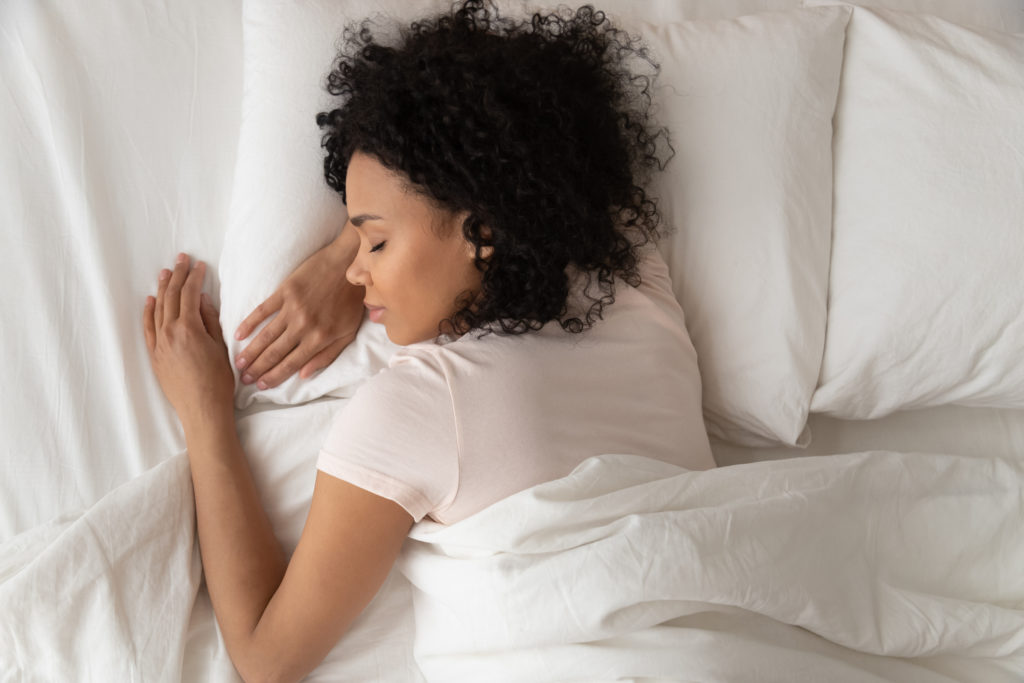
Did you know that how you sleep affects your health? There are some common sleep positions that could be good or bad for you. See which one applies to you below:
1. On Your Back, Arms at Sides
Sleeping on your back with your arms at your side is generally considered to be the best sleeping position for spine health and it’s good for your neck, too, as long as you don’t use too many pillows.
That said, back sleepers tend to snore more than those in any other position, and sleep apnea is strongly associated with sleeping on the back.
RELATED: 7 Reasons Why You Can’t Sleep
2. Fetal Position
Sleeping all curled up into a ball with your knees drawn up and your chin tilted down might be comfortable but it’s probably one of the worst sleeping positions to consider as it can do a number on your back and neck.
The extreme curl of the fetal position can also restrict deep breathing. That considered, sleeping like a fetus can have you sleeping like a baby if you typically have problems with snoring or if you’re pregnant.
There’s a reason why this is the most popular sleep position. The fetal position has loads of benefits. Not only is it great for lower back pain or pregnancy, but sleeping in the fetal position can help reduce snoring.
Unfortunately, sleeping in a fetal position does have a few downsides. Make sure your posture is relatively loose, otherwise, your comfy position could limit deep breathing while you snooze.
Also, if you have any issues with joint pain or stiffness, sleeping in a tight fetal position might leave you sore in the morning.

3. On Side, Arms at Sides
When you’re sleeping on your side with both arms down, the spine is best supported in its natural curve. This can definitely help reduce back and neck pain while also reducing sleep apnea.
The downside? Sleeping on your side can contribute to skin aging due to gravity, meaning facial wrinkles and sagging breasts.
One thing to consider is if you suffer from heartburn, sleeping on your right side can make symptoms worse. That’s true for people who have gastroesophageal reflux disease (GERD) and for people who have heartburn for other reasons, such as pregnant women. Flip to your left side to cool the burn.
4. On Side, Arms Out
This position has many of the same benefits as sleeping on your side with your arms straight down. However, any side sleeping can cause shoulder and arm pain due to restricted blood flow and pressure on the nerves, which may be exacerbated by having your arms out in front of you.
RELATED: Natural Ways To Sleep Better
5. On the Right Side
If you’re a side sleeper, which side you sleep on also makes a difference. Sleeping on the right side can worsen heartburn while sleeping on the left side can put a strain on internal organs like the liver, lungs, and stomach (while minimizing acid reflux).
For pregnant sleepers, doctors typically advise sleeping on the left side, since this can improve circulation to the fetus.
Another benefit to sleeping on your right side is reduced snoring, a common symptom seen in obstructive sleep apnea. This serious condition creates disruptions in breathing, which can lead to long-term complications, such as:
- diabetes
- heart attack
- cognitive issues
One notable drawback to sleeping on your right side is that it can increase your risk of shoulder pain.
Whether you’re on your left or right side, the corresponding shoulder can collapse into the mattress as well as up toward your neck, creating misalignment and pain the next morning.
A firm mattress and pillow can help alleviate this risk, as well as keeping your head straight in line with your shoulders.

Honorable Mention: Sleeping On Your Stomach
While the majority of Americans over 35 sleep in the positions above, there is also a good number who sleep on their stomach. Here are a few things to consider:
Stomach sleeping eases snoring and some cases of sleep apnea, but that's pretty much the few good things about going belly-down at night.
Resting on the tummy is widely regarded as the worst sleeping position. It flattens the natural curve of the spine, which can lead to lower back pain and stiffen the neck.
Also, pregnant women need to be cautious about sleeping on their stomach even in the first trimester.








